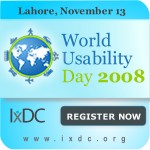Two months ago, this Urdu + English “sponsored link” ad for a website worstnation.com started showing up in my Gmail every day. I will not link to it for obvious reasons, but here’s what is says:
دنیا کی سب سے بدترین قوم
www.WorstNation.com
پاکستان سے زندہ بھاگ آپ یقیناً اتفاق کریں گے۔
The Urdu text translates roughly to “World’s Worst Nation“, “You will surely agree” and “Get out of Pakistan Alive” – the later is a wordplay on “Pakistan Zindabad“, which means “Long Live Pakistan“, and has been in use to ridicule Pakistan for atleast a decade. On the site, there is an almost exhaustive list of the many things wrong with Pakistan, in Urdu.
The first time I saw the ad, I checked the whois information out of curiosity and found out that the domain was registered to some guy in Faisalabad. I assumed that the owner was just another Pakistani frustrated at being born with brown skin, and that he was just utilizing the free adword credit that some hosts offer. The ad and the website were mildly irritating, but so is 90% 99% of the world, so I moved on.
Two months have passed since I first saw this ad – many bombs have exploded and hundreds of people have been killed in all four of our provinces – by terrorists, by our army, by the Americans and recently – by our ordinary(?) citizens – in the name of nationalism, peace, honor, ethnic cleansing, and various variants of God as well. The killings are still going on in Karachi as I write this.
The worstnation.com website, meanwhile, is still advertising relentlessly – I see its targeted message more than a dozen times a day, with its cryptic “About us” page that says “our identities really don’t matter, just listen to our message or go do something else”, and the owners of the website are still spending money to make their voices heard. A Google search tells me that atleast one other person noticed this last month and rightly recognized the demoralizing effect of such propaganda material, but blamed it on “international efforts to demoralize our nation”. He also mentioned seeing an indian flag favicon on the domain, a domain that is registered under a false name – after all, Indians are the real enemy, right?
After two months, the owners of worstnation have learnt from their mistakes, there is no indian flag and the whois information has disappeared from the database behind a privacy protection service though the clocktowercity website is still alive and clicking.
If you check the server for worstnation.com on http://www.myipneighbors.com/ , you will notice half a dozen websites that can have a relationship with Pakistan and are hosted on the same server – a few of them are:
http://oururdu.com/forums/index.php
http://irfan-ul-quran.com/quran/index.php?tid=12
http://www.minhajforums.com/forums/index.php?showtopic=29
The irfan-ul-quran website has this favicon  that was mistaken for an Indian flag. The forums page on the last link lists 40 websites that they run, and mentions with a smile that they have (created and are running)
that was mistaken for an Indian flag. The forums page on the last link lists 40 websites that they run, and mentions with a smile that they have (created and are running)
..and a lot more that cannot be listed here
So, My dear brethren in Islam (who are stuck-in-the-worst-nation-of-the-world through no fault of your own), I respect your opinions regarding the state of our nation and even agree with many of the points on your website, but hiding behind private websites and talking about revolutions is no way to start a revolution!
When you say we are the worst nation, please speak for yourself, not me – and please publish your identities on your website, don’t just hit and hide… who knows, you might get lucky and start a revolution by mistake – or you might get lucky and get the death penalty (read ‘heaven’) for disrupting national harmony in cyberspace – at least that is what the new cybercrime law asks for. Either way, it is a win-win situation for you, you lucky guys! So please don’t be shy and reveal yourselves to the public. You have nothing to lose and a lot to gain.
I love your bitterness and sarcasm, but after identifying all the problems of this nation in a couple of months, I was expecting to hear the solution to those problems from your own anonymous-yet-expert beaks. If getting out of Pakistan alive (Hijrat to Canada perhaps?) is your thing, then let me know if I can help you in any way. But whatever you do, for Allah’s sake, please stop the frigging advertising on GMail – it is irritating!
PS. and change your flag – it does resemble the indian flag.

 Osama of GreenWhite.org tagged me on FaceBook to describe a metaphor that I would use for ‘hope’. I would have shied away from such an invitation, but since Osama’s objective is to “get people talking” (and hopefully, thinking and doing as a consequence), so I’ll bite and dump my thoughts on ‘hope’ here, but first, the disclaimer.
Osama of GreenWhite.org tagged me on FaceBook to describe a metaphor that I would use for ‘hope’. I would have shied away from such an invitation, but since Osama’s objective is to “get people talking” (and hopefully, thinking and doing as a consequence), so I’ll bite and dump my thoughts on ‘hope’ here, but first, the disclaimer.